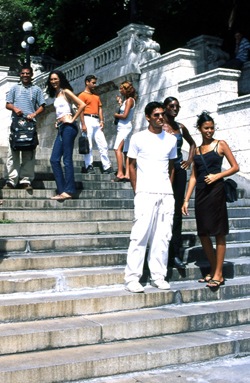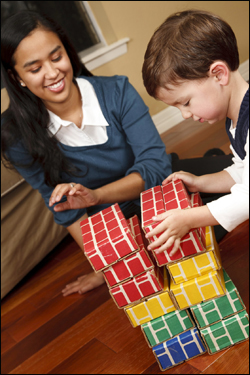Education
Education in Cuba has been a top priority for the government ever since 1959. Almost 10% of the central budget is allocated to the educational system (compared to the 4% in the United Kingdom and 2% in the United States according to UNESCO) providing free education, school meals, uniforms as well as free morning and after-school care for students at all levels. With the maximum number of students per class set at 25 and a strict 1:12 teacher to student ratio, the Cuban education functions under the principle that for Cuba to be strong, it's citizens must be educated and active participants in society.
Secondary School Teaching Assistant

- Help prepare subject material for presentation to students according to an approved curriculum
- Learn how to teach students using a systematic plan of lectures, discussions, audio-visual presentations, and laboratory, shop and field studies
- Assist with assigning and correcting homework
- Prepare, administer and correct tests
- Observe how to evaluate progress, determine individual needs of students and discuss results with parents and school officials
- Assist in the preparation and implementation of remedial programs for students requiring extra help
- Observe staff meetings, educational conferences and teacher training workshops
- May learn how to teach and evaluate students through distance or online courses
- May learn how to counsel students on course selection and on vocational and personal matters
- May supervise student teachers
Elementary School Teaching Assistant

- Assist students with integration into the classroom and school setting
- Help students individually or in small groups with assignments and reinforce learning and retention concepts under the supervision of classroom teacher
- May assist students with special needs using techniques such as sign language, Braille and remedial programs
- Monitor and report student progress to classroom teacher
- Accompany and supervise students during activities in school gymnasiums, laboratories, libraries, resource centres and on field trips
- May assist teacher in the operation of projectors, tape recorders and other audio-visual or electronic equipment
- May assist in school library or office and perform other duties assigned by school principal
- May monitor students during recess, at noon hour or during the day.
Educational Counsellor

- Learn to counsel students regarding educational issues such as course and program selection, time tables and scheduling, school adjustment, attendance problems and study skills
- Learn to counsel students regarding career or vocational issues including career exploration and planning, résumé preparation, job interview skills and job search strategies and make available to them a wide range of educational and occupational information
- Help co-ordinate co-op and school-to-work transition programs, and the provision of counselling and information services, such as career information, professional development sessions and exchanges with other educational institutions, to students, parents, teachers, faculty and staff
- Observe consultations with teachers and parents or faculty and other professionals such as psychologists, speech therapists and social workers regarding various issues and concerns, and with administrators and community agencies regarding programs and referrals
- Help administer and interpret standardized intelligence, personality, vocational, aptitude and interest tests
- Develop and co-ordinate study skills groups or workshops in high schools, colleges and universities on topics such as note-taking, test or examination anxiety and preparation strategies and time management skills
- Attend colleges and secondary school presentations to provide academic information to prospective students, their parents and educational counsellors
- Help co-ordinate or participate in student orientation programs in colleges or universities
- Help arrange for employers to recruit graduating college and university students, and students for co-op education work terms
- Learn to counsel students regarding personal and social issues such as substance abuse, depression, sexuality, eating disorders, anxiety, self-esteem, family problems, relationship and interpersonal skills and anger management
- Learn steps involved in counselling students in crisis situations such as dealing with the death of a friend or family member, suicidal tendencies and abuse situations
- May supervise peer counselling programs in school settings
- May supervise field experience for graduate students in counselling
- May assist with teaching regular classes.
Pre-School Worker

- Learn how to develop and implement child-care programs that support and promote the physical, cognitive, emotional and social development of children
- Help lead activities by telling or reading stories, teaching songs, taking children to local points of interest and providing opportunities to express creativity through the media of art, dramatic play, music and physical activity
- Familiarize self with steps needed to plan and maintain an environment that protects the health, security and well-being of children
- Learn to assess the abilities, interests and needs of children and discuss progress or problems with parents and other staff members
- Observe children for signs of potential learning or behavioural problems and prepare reports for parents, guardians or supervisor
- Guide and assist children in the development of proper eating, dressing and toilet habits
- Assist in establishing and maintaining collaborative relationships with co-workers and community service providers working with children
- May help plan and organize activities for school-age children in child-care programs before and after regular school hours
- May supervise and co-ordinate activities of other early childhood educators and early childhood educator assistants.
Instructor of Persons with Disabilities
- May assist students with lessons under direct supervision of classroom teacher
- Help monitor and report to classroom teacher on student progress
- Assist in preparation of learning materials and environment
- Accompany and supervise students during activities in school gymnasiums, laboratories, libraries, resource centres and on field trips
- Become familiar with how to assist special needs students, such as those with mental or physical disabilities, with mobility, communication and personal hygiene
- Prepare classroom displays and bulletin boards
- Operate or assist teacher in operation of projectors, tape recorders and other audio-visual equipment and office equipment such as photocopier, fax machine and computer
- Learn how to carry out behaviour modification, personal development and other therapeutic programs under supervision of professionals such as special education instructors, psychologists or speech-language pathologists
- Observe the techniques used when working with special needs students such as sign language, Bliss symbols or Braille
- Help monitor students during recess, at noon hour or during the day
- May assist with marking of tests and worksheets
- Assist with classroom inventory
- Assist in school library or office and perform other duties assigned by school principal
